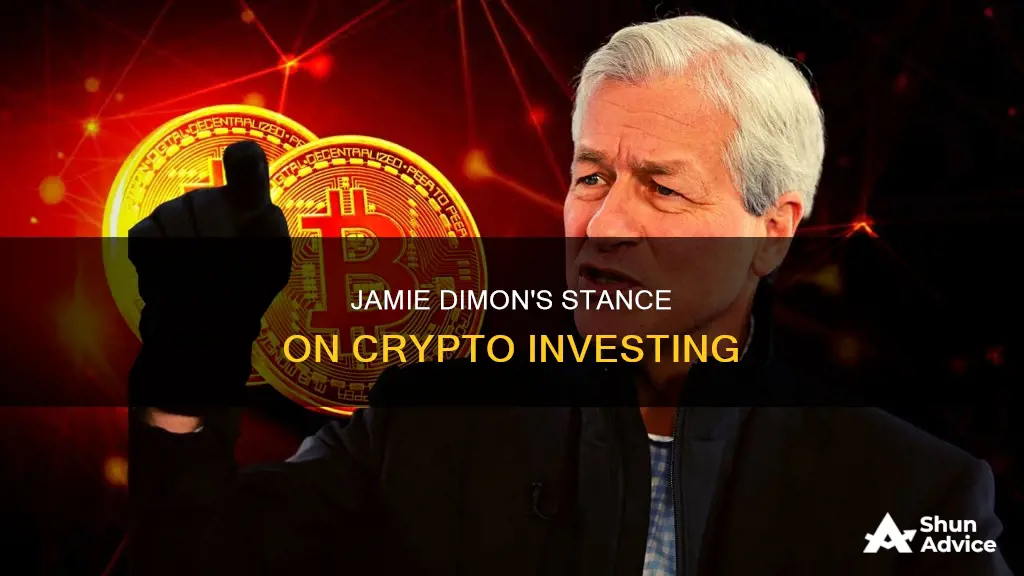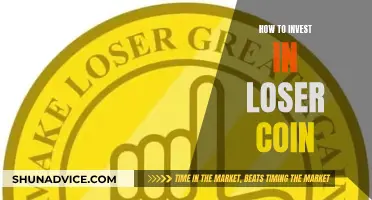
Jamie Dimon is an American banker and businessman who has been the chairman and CEO of JPMorgan Chase since 2005. He has been one of the strongest critics of Bitcoin and cryptocurrencies, calling them a “fraud” and a “terrible store of value”. However, despite his negative comments, JPMorgan Chase uses blockchain technology in their JPM Coin offering. Dimon has also expressed his opposition to cryptocurrencies and Bitcoin, stating that if he were the government, he would shut crypto down. Despite his criticism, Dimon has acknowledged the potential of blockchain technology, distinguishing it from cryptocurrencies.
| Characteristics | Values |
|---|---|
| Name | James L. "Jamie" Dimon |
| Profession | Banker, businessman, billionaire |
| Company | JPMorgan Chase |
| Position | Chairman and CEO |
| Net worth | $2 billion as of February 2024 |
| Cryptocurrency stance | Critic, has called it a "fraud" and a decentralized Ponzi scheme |
| Bitcoin opinion | "Pet rock", "worthless", "hyped-up fraud" |
| Blockchain opinion | "Real", useful technology |
| Regulation view | Would only use cryptocurrencies if fully regulated |
What You'll Learn

Jamie Dimon's criticism of Bitcoin
Jamie Dimon, the billionaire CEO of JPMorgan Chase, has been a vocal critic of Bitcoin since its early days. Here is a detailed overview of his criticisms:
Bitcoin is a "Fraud"
Dimon's most famous criticism of Bitcoin is calling it a "fraud". He made this comment in September 2017, adding that he would fire any JPMorgan traders dealing with Bitcoin. He also said that Bitcoin investors are ""stupid" and that it won't "end well" for them.
Bitcoin is a "Novelty" and a Bubble
Dimon has also called Bitcoin a "novelty", suggesting that its popularity is based on people's fascination with new technology rather than its inherent value. He compared the Bitcoin market to the 17th-century tulip bulb market bubble in the Netherlands, implying that it is an even more extreme example of speculative investing.
Bitcoin Has No Intrinsic Value
Dimon has argued that Bitcoin "is worth nothing" and that it is a "terrible store of value". He believes it can be easily replicated and does not have the backing of any government or central bank, which are crucial for fiat currencies.
Bitcoin Facilitates Criminal Activities
Dimon has stated that the only "real use cases" for Bitcoin are criminal activities like sex trafficking, money laundering, drug trafficking, and tax avoidance. He believes that cryptocurrencies, in general, are "decentralized Ponzi schemes" that threaten the traditional financial system and its safeguards against illicit finance.
Governments Will Shut Down Bitcoin
Dimon predicts that governments will eventually shut down Bitcoin and cryptocurrencies if they become too big. He argues that governments need to control money and know where it is, who has it, and how it is being used. He suggests that governments will attempt to control cryptocurrencies by threatening imprisonment for anyone buying or selling them, forcing them into the black market.
Blockchain Technology is More Valuable
While criticizing Bitcoin, Dimon has praised the underlying blockchain technology. He acknowledges that blockchain has valuable applications, including in digital currencies, and that it can be used to improve efficiency in interbank payments. JPMorgan itself has launched blockchain initiatives and a blockchain-based digital coin, JPM Coin.
Teen's Guide to Bitcoin: Getting Started with Crypto
You may want to see also

Jamie Dimon's stance on blockchain technology
Jamie Dimon, the CEO of JPMorgan Chase, has been a vocal critic of cryptocurrencies such as Bitcoin, calling them a "fraud" and "worse than tulip bulbs". However, his stance on blockchain technology, the underlying technology for cryptocurrencies, is more positive.
In 2017, Dimon called Bitcoin a "fraud" and said he would fire any JPMorgan traders dealing in Bitcoin. He also compared cryptocurrencies to the 17th-century Dutch tulip mania, saying, "It’s worse than tulip bulbs". Despite these negative comments about Bitcoin and other cryptocurrencies, Dimon has expressed support for blockchain technology. In 2017, just a month after his "fraud" comment, JPMorgan launched its blockchain initiative to facilitate interbank payments. Dimon himself talked up blockchain's potential, saying, "The blockchain is a technology which is a good technology. We actually use it... Cryptocurrencies, digital currencies, I think are also fine... If it can be done digitally with the blockchain, so be it".
JPMorgan has since developed its own blockchain-enabled cryptocurrency, JPM Coin, for institutional clients. The coin has a value pegged to the US dollar and is used for instant financial transactions. The bank has also been enabling crypto purchases for its clients, with Dimon saying, "Our clients are adults. They disagree. That’s what makes markets. So, if they want to have access to buy yourself Bitcoin, we can’t custody it, but we can give them legitimate, as clean as possible, access".
Dimon has continued to lambast Bitcoin as worthless, even as his firm enables more and more crypto transactions. However, he has been careful to separate his criticism of existing cryptocurrencies from his praise of blockchains, saying, "We believe there are many uses where a blockchain can replace or improve contracts, data ownership, and other enhancements".
In summary, while Jamie Dimon has been a strong critic of cryptocurrencies like Bitcoin, he has expressed support for blockchain technology and its potential to improve various aspects of finance and data ownership. JPMorgan Chase, under Dimon's leadership, has been actively adopting blockchain technology and developing its own blockchain-related products.
Royal Mint Coins: Worthy Investment or Costly Mistake?
You may want to see also

Jamie Dimon's net worth
Jamie Dimon, the CEO of JPMorgan Chase, has been one of the most vocal critics of Bitcoin and cryptocurrencies. Despite his negative stance on crypto, Dimon's net worth is substantial, and as of February 2024, it was estimated to be around $2 billion.
Dimon's wealth is largely tied to his holdings in JPMorgan's shares, and he has been well-compensated with stock grants for meeting internal targets. As of November 3, 2023, the value of his shares was estimated to be over $1 billion. Including other earnings and investments, his net worth is likely to be at least $1.7 billion, making him one of the wealthiest banking executives in the US.
Dimon's career began as a management consultant at Boston Consulting Group. He then moved to American Express, where he worked as an assistant to Sanford "Sandy" Weill. Dimon played a crucial role in the formation of Citigroup, but later left due to a falling out with Weill. He joined Banc One as CEO in 2000 and successfully turned the company around, leading to its acquisition by JPMorgan in 2004.
Dimon's base salary as of 2022 was $1.5 million, but his total compensation for that year, including performance-based incentives, amounted to $34.5 million. His wealth is heavily dependent on JPMorgan's share price, and a significant drop could affect his billionaire status.
While Dimon has been an outspoken critic of cryptocurrencies, JPMorgan has not been immune to the crypto space. The bank launched its blockchain initiative in 2017 and introduced its own dollar-backed digital coin, JPM Coin, in 2019. Despite his opposition, Dimon has acknowledged the potential of blockchain technology, which underpins cryptocurrencies.
The Ultimate Guide to Investing in Bitcoin
You may want to see also

JPMorgan Chase's stance on cryptocurrencies
JPMorgan Chase's CEO, Jamie Dimon, has been a vocal critic of Bitcoin and cryptocurrencies. As early as 2014, Dimon has made negative comments about Bitcoin, calling it a "terrible store of value" that "doesn't have the standing of a government". In 2017, he went further, calling Bitcoin a “fraud” and stating that any JPMorgan traders dealing in Bitcoin would be fired. He also referred to the cryptocurrency as "worse than tulip bulbs", referencing the famous market bubble.
Despite his criticism of cryptocurrencies, Dimon has expressed interest in the potential of blockchain technology. In 2017, JPMorgan launched its blockchain initiative for interbank payments, and the company has continued to experiment with blockchain technology. In 2019, JPMorgan introduced its own dollar-backed digital coin, JPM Coin, for payments between clients. While Dimon's personal stance on cryptocurrencies appears negative, JPMorgan Chase has been actively exploring blockchain and digital currency options.
In recent years, Dimon's comments on cryptocurrencies have become more nuanced. In 2018, he expressed a new-found acceptance of cryptocurrencies, but only if they were fully regulated. In 2023, he reiterated his opposition to crypto and bitcoin, stating that their only true use case is for criminals and that if he were the government, he would "close it down". However, he also acknowledged the right of investors to buy Bitcoin, stating that it is a "free country".
While JPMorgan Chase has been involved with blockchain technology and even introduced its own digital coin, the company's stance on cryptocurrencies remains cautious. As a traditional financial institution, JPMorgan Chase must navigate the regulatory and risk landscape surrounding cryptocurrencies. The company has been involved with crypto-related initiatives, such as being an authorized participant for BlackRock's bitcoin ETF. However, the company's leadership, including Dimon, has expressed concerns about the lack of regulation and the potential risks associated with cryptocurrencies.
Bitcoin: What Is It and Is It a Smart Investment?
You may want to see also

Jamie Dimon's career
James L. "Jamie" Dimon is an American banker and businessman. He has been the chairman and chief executive officer (CEO) of JPMorgan Chase since 2006.
Dimon began his career as a management consultant at Boston Consulting Group. After graduating from Tufts University with a degree in psychology and economics, he joined American Express with an early mentor, Sandy Weill, working there until 1985. Dimon was appointed chief financial officer (CFO) of Commercial Credit in 1986, at the age of 30, and later became the firm's president. He was the chief operating officer (COO) of both insurer Travelers and brokerage firm Smith Barney from 1990 to 1998, becoming the president of Citigroup in 1998.
In 2000, Dimon was appointed the CEO of Bank One, overseeing its operations until its merger with JPMorgan Chase in 2004. During his time at Bank One, Dimon was a prominent donor to the Democratic Party. He was considered for the position of Secretary of the Treasury in the Obama administration, but the role ultimately went to Timothy Geithner. Dimon has often publicly disagreed with some of Obama's policies.
Dimon then became the COO of JPMorgan Chase, assuming the role of CEO in 2006. Under his leadership, JPMorgan Chase has become the leading U.S. bank in domestic assets under management, market capitalization value, and publicly traded stock value. Dimon has been included in Time magazine's list of the world's 100 most influential people several times. As of 2024, his net worth is estimated to be $2 billion.
In May 2023, Dimon testified under oath in connection with two lawsuits filed against JPMorgan Chase. The plaintiffs accused the bank of serving the late sex offender Jeffrey Epstein. Dimon has also faced criticism for his comments about Bitcoin and cryptocurrency, having referred to Bitcoin as a "fraud" and a pet rock. Despite this, JPMorgan Chase has been incorporating blockchain technology into its operations.
Dogecoin Investment: Coinbase's Role Explored
You may want to see also
Frequently asked questions
Jamie Dimon has been a vocal critic of cryptocurrencies, calling them decentralized Ponzi schemes and a fraud. He has also expressed his opposition to Bitcoin, stating that it is a terrible store of value. However, Dimon has shown support for blockchain technology, which is the underlying technology for cryptocurrencies.
No, Jamie Dimon's stance on cryptocurrencies appears to have evolved over time. While he has made negative comments about Bitcoin since at least 2014, in 2018, he made headlines for his newfound acceptance of cryptocurrencies, stating that he would only agree to use them if they were fully regulated.
It is not clear if Jamie Dimon personally invests in cryptocurrencies. However, as the CEO of JPMorgan Chase, he has overseen the bank's involvement in blockchain technology and the launch of its own blockchain platform, Onyx, and a dollar-backed digital coin called JPM Coin.
Jamie Dimon's opposition to cryptocurrencies stems from his belief that they are associated with criminal activities and illicit finance. He has stated that the only real use cases for Bitcoin are in criminal activities such as sex trafficking, money laundering, and tax avoidance.
Jamie Dimon's stance on Bitcoin appears to have softened slightly over time. While he still maintains his criticism of Bitcoin, he has acknowledged that blockchain technology, which underpins cryptocurrencies, has legitimate uses. In 2024, he stated that he would no longer talk about Bitcoin, indicating his desire to move on from the topic.







